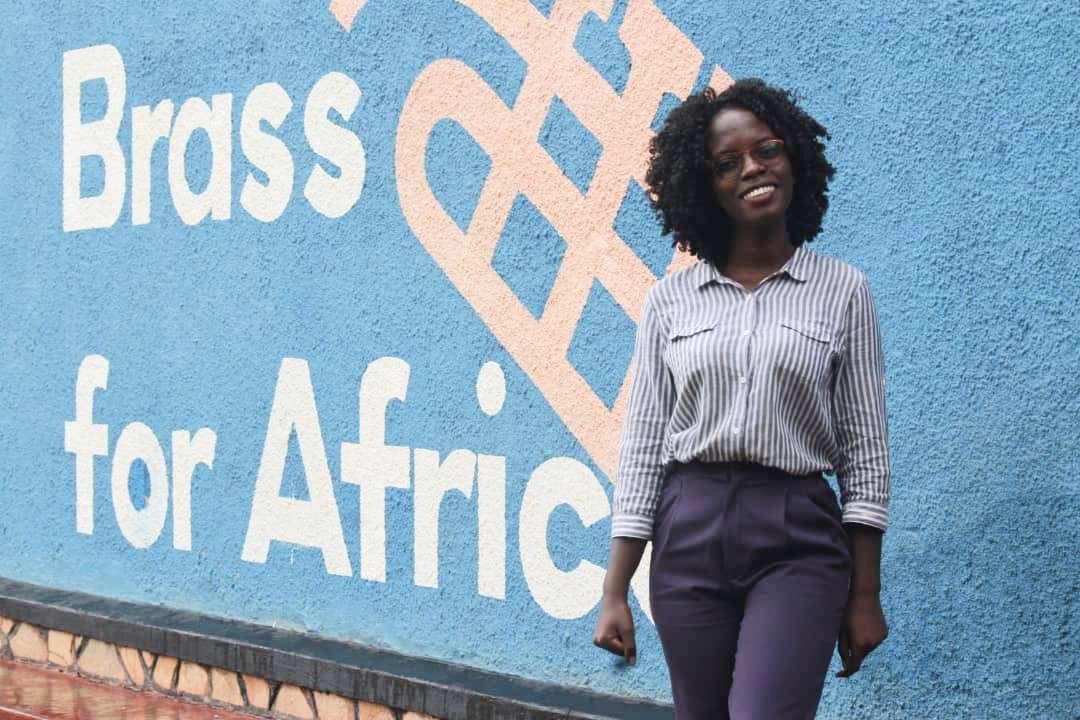Could you tell us a bit about yourself and your background?
My name is Estella, I am studying for a Bachelor of Development Studies. I grew up in Kampala, in the area where the Brass for Africa office is located!
Where did you hear about Brass for Africa?
I used to see them around and I would see them play, but I didn’t know what they did. So when I started looking for internships, my friend told me “Oh, Brass for Africa is an NGO and they do some great work, so you could try”. So I applied for an internship as I have always been interested in doing something like Monitoring & Evaluation; I wanted to study it but I had not yet got the chance, so this is a great opportunity to learn.
Tell us about your internship with Brass for Africa!
I helped with the baseline survey about Autism. I was taking the registration forms to the participating organisations so that we could explain the form to them, and help them understand how to fill it in. I was also helping to fill in the parental contact information into a database; I started learning about the system they use here at Brass for Africa, how they keep the information, how they schedule their programmes, the bands, things like that!
Could you explain the process of how Monitoring & Evaluation works when we start a new programme? And what about with ongoing programmes?
For Monitoring and Evaluation, when a programme is starting, what I have learnt is that the team first plans for it, they schedule the resources, the management, get all the information of who is going to be involved, and how everything is going to be done. They keep track of the progress and efficiency of the activities. You are supposed to plan for the potential risks as well, because of course when you are doing a project you don’t know what will happen in the future, but you are supposed to be ready for it so that the project is successful. You keep monitoring what the beneficiaries are up to: do they feel like the programme is useful to them, and for their communities, for example? The project must be sustainable, so that when it potentially finishes, the people who have been involved will keep it going so that it is not forgotten and so that it can continue to be instilled into someone’s life. Then you sit down and evaluate that you and the team are working well, and managing the resources correctly. The supporters who have provided funds for you can also come and evaluate the project themselves, to see whether the goals are being met.
What are your favourite things about working for Brass for Africa?
The team is very nice and I feel that I can always ask something that I don’t know, and someone can help guide me through it and help me learn. They have also given me the challenge to learn because some things I have to do on my own – if someone is busy then it is important to figure out the system yourself. You have to challenge yourself to solve problems and be relied on and depended on. People around you count on you, so the team here allows me to grow every day.
As a woman, what do you think are the challenges for girls and young women striving for employment opportunities in Uganda?
Some girls don’t have the opportunity to go to school, so they aren’t able to get the qualifications to get a good job. There is also the problem of having an education, but no opportunities after that. It is a challenge for many women. There are many organizations where they value male input more, and there are no positions for women. So even if you have very good grades and you’re very bright and willing to work, you still won’t get the CEO job because you are a woman.
What changes do you wish to see in Africa?
I would like to see girls going to school and being more confident, fighting for what they want, without being shy or scared, and believing in themselves more.
At Brass for Africa, the bands have both boys and girls, so if a young girl is able to see that, it is a great thing because she can then realise that if a boy can do it then so can she, and if he can have this position then so can she.
What are you hoping to do in the future?
I hope to get a job and help people. I would like to help people around me. I would like to work for an NGO for women who have suffered abuse. I would like to learn more and meet experienced people who can teach me a lot.

